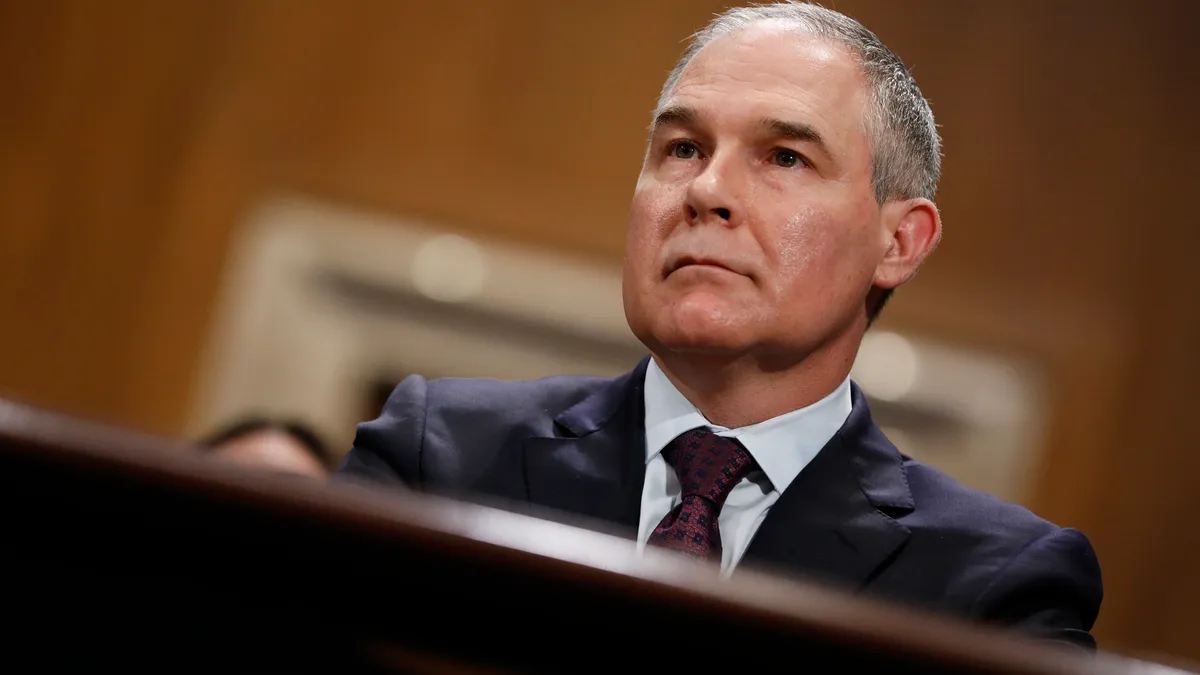Dive Brief:
- U.S. Environmental Protection Agency Administrator Scott Pruitt on Tuesday signed a proposal to repeal the Clean Power Plan, an Obama-era rule aimed at slashing carbon emissions from the power sector.
- A draft of the repeal proposal argued the Obama administration's rule was illegal because it directed utilities to reduce emissions only achievable "outside the fenceline" of individual power plants, such as purchasing renewable energy or closing coal plants in favor of natural gas investment.
- However, the EPA in the draft document stressed it has not determined whether it would regulate carbon emissions and requested industry comments to inform its next steps. Most industry observers expect the agency to respond with a less-stringent regulation aimed at modest efficiency improvements for coal plants.
Dive Insight:
Pruitt, who challenged the CPP during his tenure as Oklahoma's Attorney General, formally moved to rescind the regulatory package on Tuesday, saying the Obama EPA had overstepped its bounds.
"The Obama administration pushed the bounds of their authority so far with the CPP that the Supreme Court issued a historic stay of the rule, preventing its devastating effects to be imposed on the American people while the rule is being challenged in court," Pruitt said in signing the rule. "We are committed to righting the wrongs of the Obama administration by cleaning the regulatory slate."
Pruitt's agency did not propose a replacement for the CPP, instead asking industry to help shape the next carbon rule.
"Any replacement rule will be done carefully, properly, and with humility, by listening to all those affected by the rule," he said.
Pruitt himself drafted an "inside of the fence" alternative to the Clean Power Plan in 2014. The narrower rule would focus on obtaining efficiency improvements through better heat rates at coal plants — an "inside the fenceline" regulation, rather than a sweeping change to the national power mix.
The Clean Power Plan reached beyond individual plant upgrades by allowing generators unable to meet its emission standards to offset their power from lower carbon-emitting resources, such as renewables. Generators argued at the D.C. Circuit Court last year that amounts to forcing coal plants to subsidize their competitors or shut down.
The Obama EPA and supporters of the rule said this so-called "generation shifting" merely underscores how utilities would have sought to comply with the CPP. Even so, outside lawyers told Utility Dive that the provisions represented new or expanded interpretation of the agency's regulatory power and be the lynchpin for future legal fights.
The Clean Power Plan, finalized in 2015, never went into effect due to a freeze from the Supreme Court in early 2016 until legal challenges concluded. The D.C. Circuit put a 60-day hold on the case in April, but has since remained silent about it since that timeframe expired June 27.
The impact of the repeal on the power sector will be limited, analysts say. The final rule was based on 2014 energy market projections, when the Energy Information Administration projected modest increases to power sector carbon emissions from their lowpoint in 2012.
Against that baseline, "the CPP was projected to have a significant impact," the analysis said. But a trend of lower gas prices, flat power demand and swiftly declining costs for wind and solar have changed the equation.
Based on these trends, the Rhodium Group found power sector emissions would fall "27% to 35% below 2005 levels – bookending EPA’s target for the CPP" despite the repeal.
The 11th-hour extension of the solar Investment Tax Credit and the wind Production Tax Credit at the end of 2015 also played a big role in those power sector trends, something Pruitt noted in a Monday announcement that he would repeal the CPP.
"I would do away with these incentives that we give to wind and solar," he said, according to the Hill. “I’d let them stand on their own and compete against coal and natural gas and other sources, and let utilities make real-time market decisions on those types of things as opposed to being propped up by tax incentives and other types of credits that occur, both in the federal level and state level."
The EPA does not oversee federal tax incentives nor wholesale power markets, which are under the purview of the Federal Energy Regulatory Commission.
If Pruitt choses to replace the CPP with a less rigorous regulation, it could mean the EPA would delay or abandoned efforts to fight the 2009 endangerment finding, which orders the agency to regulate carbon as a public health threat.
Conservative interests are urging Pruitt to take up that fight, but it would be an onerous legal battle, compelling the EPA to prove in court that greenhouse gases are not a health threat. But Pruitt signed onto a legal challenge to the finding in 2012, demonstrating appetite to tackle the issue. And a reported review of climate science at the EPA could give him leverage from a suite of like-minded climate opinions to draw from in such a battle.
This post has been updated to reflect official signing of the CPP repeal.














